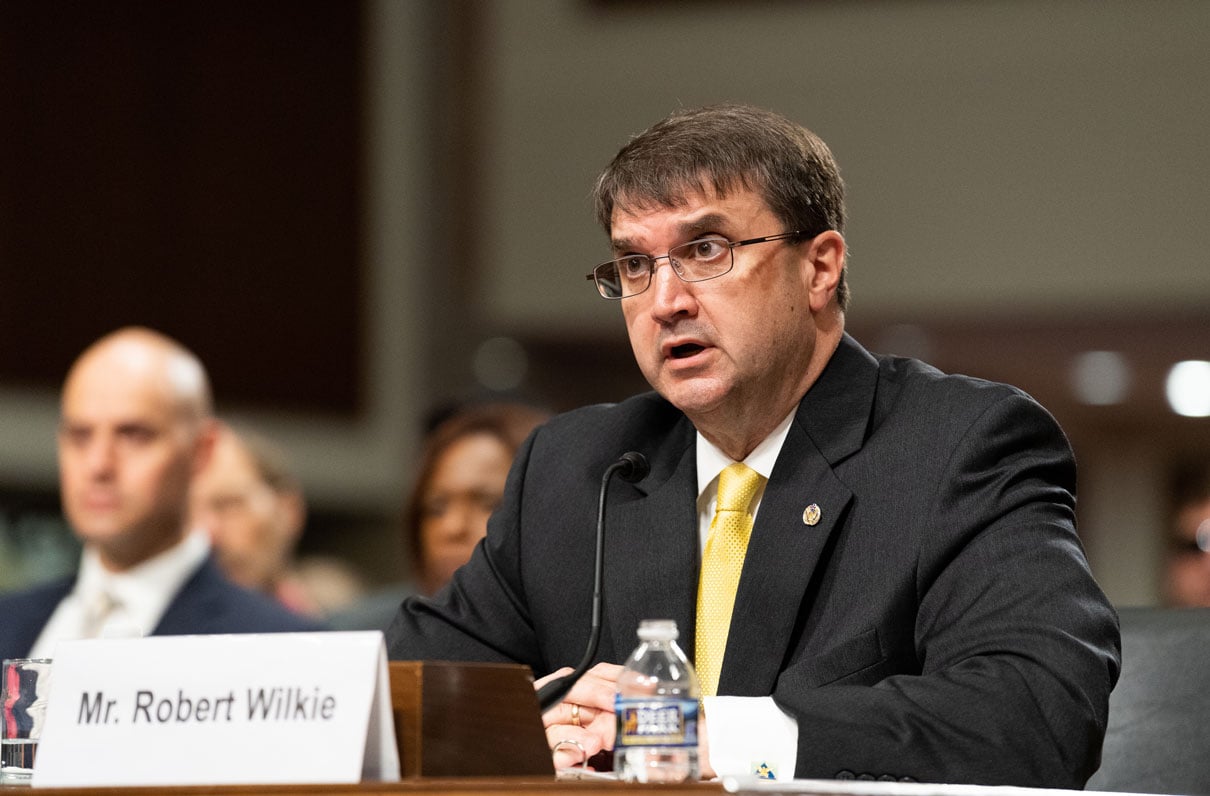President Donald Trump's pick to run the Department of Veterans Affairs has pledged to improve access to health care in rural areas and decrease patients' wait times - all while protecting the agency from the threat of privatization.
Robert Wilkie, who faced the Senate Veterans Affairs Committee Wednesday during his nomination hearing, has more than 20 years of experience serving the nation from home and abroad. Aside from being Trump's choice to lead the massive VA health system with its 1,700 centers that care for 9 million people, Wilkie currently serves as undersecretary of defense for personnel and readiness for the Defense Department.
He's also a lieutenant colonel in the Air Force Reserve and is currently assigned to the office of the chief of staff.
Marine Lt. Col. Aniela Szymanski, MOAA's director of Government Relations for Reserve and National Guard and Veterans Benefits, said Wilkie showed he was unwilling to accept excuses when he said the VA must do better for veterans. He must consult veterans' service organizations, including MOAA, she said, to lead the agency effectively.
“As with all prior secretary nominees, though, the real hard work is still before him and it remains to be seen how well he does,” Szymanski added.
The top job at the VA has been open for about three months following Trump's decision to remove former Secretary David Shulkin from the position. Trump named Wilkie to be acting secretary following Shulkin's departure, but the nominee was required to step down during the confirmation hearing process.
Wilkie's nomination has not come without scrutiny. A day before his confirmation hearing, the Washington Post published an article tracing his career back to his early days as an aide for a senator who made disparaging comments about gay people and another who called on Congress to require young women to finish high school as a condition of receiving welfare.
When senators pressed Wilkie on the report and his ability to serve veterans of all backgrounds, genders and sexual preferences, Wilkie said he was confident he would be able to do so, welcoming the scrutiny of his record.
Here are some of the top priorities Wilkie said he'd tackle if confirmed to lead the VA.
On privatization: Sen. Bernie Sanders, the Vermont Independent, said Shulkin indicated he'd been ousted because he wasn't moving fast enough on privatizing the VA. Sanders and Sen. Sherrod Brown, D-Ohio, asked Wilkie about his views on the push to move more veteran health care to the private sector.
“My commitment is that I will oppose privatization,” Wilkie said.
On decreasing VA wait times: As one of the few senators that voted against the VA Mission Act, Sen. Mike Rounds, R-S.D., said his main concern was getting veterans access to health care in a timely manner.
The VA Mission Act, which was signed into law earlier this month, includes a provision to consolidate several community care programs - including VA Choice - that allow veterans to see private doctors if they cannot get VA appointments. Rounds pressed Wilkie to explain what he finds to be a reasonable time for veterans awaiting care.
“It's complicated,” Wilkie said. “It depends on what the veteran is seeking. If the veteran is seeking a yearly physical, I'm not expecting the VA to handle that in two to three days. Thirty days is not acceptable.”
The VA is pursuing a new computer system that will help prioritize requests so veterans with dire needs get appointments faster. But it could take several years to fully integrate, he said.
In the meantime, Wilkie said he'd like to see better training for VA employees who schedule for appointments.
On improving rural-area health care: For veterans in Montana or Hawaii, a trip to the closest VA facility could mean a 600-mile roundtrip drive or even hopping in a plane.
Several senators expressed concern about rural-area veterans' access to care. Construction on new centers would help, but they also need to be able to recruit and retain doctors to work in them, Sen. Dean Heller, R-Nev., said.
Wilkie agreed, and said he'd look into new incentives for medical positions.
“We have to do a better job of training doctors coming out of the military and learn how to get commitments from doctors to working with the VA,” Wilkie said. “In exchange for their service, do we go down the road of taking care of the medical school loans? We do need to make an assessment as to where we need our doctors. We need to get those underserved areas looked at.”
On electronic-health records: Wilkie said one of his top priorities is to improve access to care - and he wants to create electronic health records for patients so they can seamlessly move between providers while tracking claims and health concerns better.
“A new electronic health record system is the first thing that will modernize the VA,” he said. “It will get us started to monitoring disability claims. Interoperability of new electronic system will connect the VA to the DoD and private doctors around the veteran's needs."
On preventing opiod abuse: Sen. Joe Manchin, D-W. Va., said there is an opioid epidemic in the military. Veterans are twice as likely to die from an accidental opioid overdose compared with civilians, according to a VA study. Manchin wanted to know how Wilkie would combat the problem.
“The VA has come up … a simple way of dealing with this: alternative therapies” Wilkie said. “The other thing the VA has done is emphasize rehab care.
“…It's absolutely vital that we stop [prescribing so many opioids].”
Amanda Dolasinski is MOAA's staff writer. She can be reached at amandad@moaa.org. Follow her on Twitter @AmandaMOAA.
